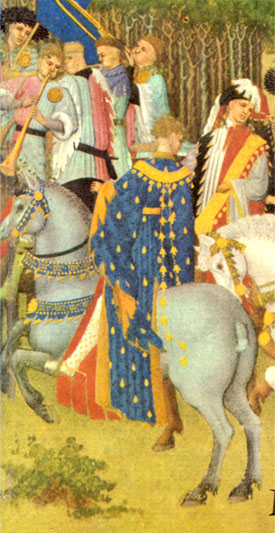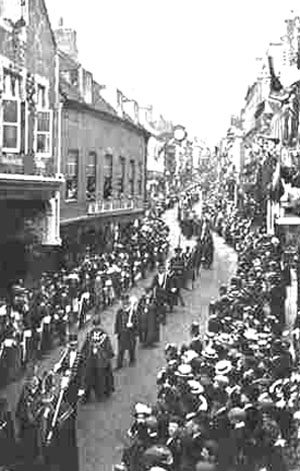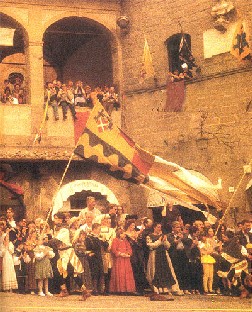 |
The Saint of the Day
St. Peter Gonzalez – April 15
Prof. Plinio Corrêa de Oliveira
Biographical selection:
Peter Gonzalez was born in 1190 in the city of Astorga, Spain, of an illustrious family. After studies in which he excelled, he was named canon of the Cathedral. His uncle, the Bishop of Astorga, obtained for him from Rome the position of dean of the chapter of canons.

Medieval pageantry pictured in the
Tres Riches Heures du Duc de Berry
|
It was planned for Peter to take possession of the dignity at Christmas. A vain youth filled with the spirit of the world, Peter desired that the ceremony should take place with great pomp before the whole city. Astride a magnificent horse in full harness, he rode through the streets of the city. When he reached a place crowded with onlookers, he spurred his horse to make it prance more elegantly and raise the applause of the people. But the horse tripped and threw the rider into a puddle of mud. The applause immediately changed into derision and laughter.
The misfortune, however, proved beneficial for him. Raising himself up, he exclaimed, “How can this be? This same world that applauds me one moment, laughs at me the next? Well, I will laugh at it in my turn. From this day onward, I will turn my back to it and seek out a better life.”
In fact, he abandoned the world and entered the austere Order of St. Dominic. He became an excellent religious and no less excellent preacher. His fame spread and reached the court of King St. Ferdinand of Castile, who asked his advice regarding the war against the Saracens. In fact, the saint accompanied the King in his expeditions against the Moors, particularly in the siege and taking of Cordova in 1236, which, from the year 718, had been the chief seat of the Moorish dominions in Spain.
Later he became apostle and preacher to the poor, and especially to sailors. He received the gift of miracles. He preached without stop until his last days and foretold his own death, which took place on April 15, 1246. The sailors of Spain and Portugal still invoke him in every storm under the name of St. Elmo (Elm or Telm).
Comments of Prof. Plinio:
The life of this saint is truly picturesque, beginning with his worldly nomination to the canonry of Astorga. You see that the man was a nephew of the Bishop and was named canon, and afterward dean of the chapter, which is the principal post among the canons.

The medieval custom of installing officials with ceremonial processions lasted into the 20th Century. Above, installing university provosts in England
|
It was a custom of the time that when a person was invested with a new important post, he would parade in a cortege through the city wearing the insignias of his new dignity acclaimed by the people. For example, if a man was named a new professor in the university, he would also pass through the city and the people would celebrate his appointment with applause and fireworks; his alumni would play music and sing. Even when a simple youth graduated from a college, he would have the right to wear a special mantle. He would don it when he returned to his city or home village so that everyone would know that he had completed his studies and merited new respect. It was a way to acknowledge the accomplishments of an educated man and permit him to enter higher social and intellectual milieus.
Some of these customs still remained in small cities of Brazil in the 1920s. A young man who finished his course and graduated in the capital would return to his village and be received by the people at the rail station with fanfare. A minor civil authority would be on hand to greet him. Then the family would have a party for him at their home with food and drink for all. In this way, the new graduate was enthroned in the small society of his village. It was a very reasonable, healthy, and picturesque tradition.
So, in Astorga we have our young canon Peter Gonzalez riding a magnificent horse and wearing the rich garments of dean of the canons. There were probably other canons riding alongside him and various parish associations following the cortege. It was an epoch when anti-clericalism was nonexistent and an ecclesiastical post was highly esteemed and appreciated by the world. Our canon entered the main street of the city and spurred his horse to make a more elegant picture. Suddenly he was thrown into a puddle of mud.

Peter Gonzalez converted when he contemplated the fickleness of the applause of the world
|
Once Napoleon was riding a horse in Paris at either the Bois de Boulogne or Champs Elysées – I forgot the place – with the ambassador of Denmark riding at his side. The people recognized Napoleon and applauded. The ambassador said to him: “Oh, Your Majesty, what a secure throne you have!” Napoleon replied: “You are mistaken, Monsieur Ambassador, the people take their revenge for the applause they give.” It is true. The onlooker is often just as ready to scorn the very one he applauds. This applies to the case of St. Peter Gonzalez. The crowd was applauding him, and when he fell, the people immediately began to deride and laugh at him.
But it was an opportunity for the grace of God to act. This reaction touched the heart of St. Peter Gonzalez, showing him the futility of worldly applause and moving him to challenge the world. With this, he broke with the world. Often this is the way grace works with Spaniards. It inspires a man to break with the world, and immediately afterward to challenge it and counter-attack it. It is like a bullfight. Our saint responded in this way. He converted, entered the Dominican Order, became a famous preacher, and even counseled King St. Ferdinand on the crusade against the Moors and accompanied him in his battles.
It is a beautiful scene: a King-saint who calls upon a preacher-saint to discuss what to do in the fight against the infidel. How different from our times! Where is the saintly King? Where is the saintly preacher? Where is the fight against the infidel? All of those magnificent things have disappeared. We should have nostalgia for those values that so deeply move our souls.
Dante said that no sadness is greater than to remember one’s past happiness in days of misery. In a certain way, we suffer this kind of sadness. We are in days of misery, and we recall the fortunate days of a bygone Christendom. We have sadness, but at least we know that such an epoch existed, that society became what it is today by the action of the Revolution, and that in future days it will be restored to even more than it was in the past. I think it is legitimate to recall these things with nostalgia.
Afterward, St. Peter Gonzalez took on other roles. One of them was to preach to the sailors. At that time, sailors were one of the lowest levels of society, rough men without faith, morals, or law – a riffraff of adventurers. St. Peter Gonzalez chose to make his apostolate in that milieu, where he moved and converted those souls. He did not need to become a worker-priest. God showed his pleasure with his preaching by giving him the gift of miracles, so that he could placate the storms to bring the sailors safely back to their ports. This shows that we do not need worker-priests, who make all kinds of concessions to the world allegedly to convert the people. But they do not convert anyone. Instead of bringing the workers to the faith, the priests themselves become atheistic, like the worst workers. The worker-priests of our times should first convert themselves, confide in God, and become saints. Then they would convert the people.
St. Peter Gonzalez preached until his last days, and foretold his own death. To foretell one’s own death is a special grace that God gives to some of His servants. It is a way to allow them to die in the sweetness and peace of God. The prospect of death causes them no panic, because they hope to arrive in Heaven very shortly. In a certain sense, it is the announcement that the gates of Heaven are open to them. They receive the warning with all naturality, they prepare themselves interiorly, then they say their farewells to their friends:
“I came to bid you adieu, for I will die on the day X.”
“Is it so? Then I beg you to please pray for me. Tell this to Our Lady. Ask that of my Guardian Angel.”
“Be assured that I will do so.”
There was no astonishment at such news, because everyone had faith. It was understood that this was the fruit of a normal albeit superlative relationship between Heaven and earth.
In these days when human respect is so strong everywhere, let us ask St. Peter Gonzalez to give us the spirit of challenge to the world that he assumed. Let us also ask for that kind of relation he had with Heaven so that each one of us might have a peaceful death.


  | | Prof. Plinio Corrêa de Oliveira | |
The Saint of the Day features highlights from the lives of saints based on comments made by the late Prof. Plinio Corrêa de Oliveira. Following the example of St. John Bosco who used to make similar talks for the boys of his College, each evening it was Prof. Plinio’s custom to make a short commentary on the lives of the next day’s saint in a meeting for youth in order to encourage them in the practice of virtue and love for the Catholic Church. TIA thought that its readers could profit from these valuable commentaries.
The texts of both the biographical data and the comments come from personal notes taken by Atila S. Guimarães from 1964 to 1995. Given the fact that the source is a personal notebook, it is possible that at times the biographic notes transcribed here will not rigorously follow the original text read by Prof. Plinio. The commentaries have also been adapted and translated for TIA’s site.
|
Saint of the Day | Home | Books | CDs | Search | Contact Us | Donate

© 2002- Tradition in Action, Inc. All Rights Reserved
|
 |

|